Future Foods, Volume 3, June 2021
Food is essential to provide energy for human cellular metabolism, and is usually made from plants or animals. Beside plants and animals, other important food sources are made by microorganisms, typically products of fermentation (e.g bread, wine, beer, soy sauce, etc). Nowadays, because of the increasing environmental pollution, climate change and population growth, is becoming challenging to keep the food supply safe, nutritious and sustainable. Importantly, the development of the synthetic biology field enable the engineering of cells that can be used in food manufacturing.

